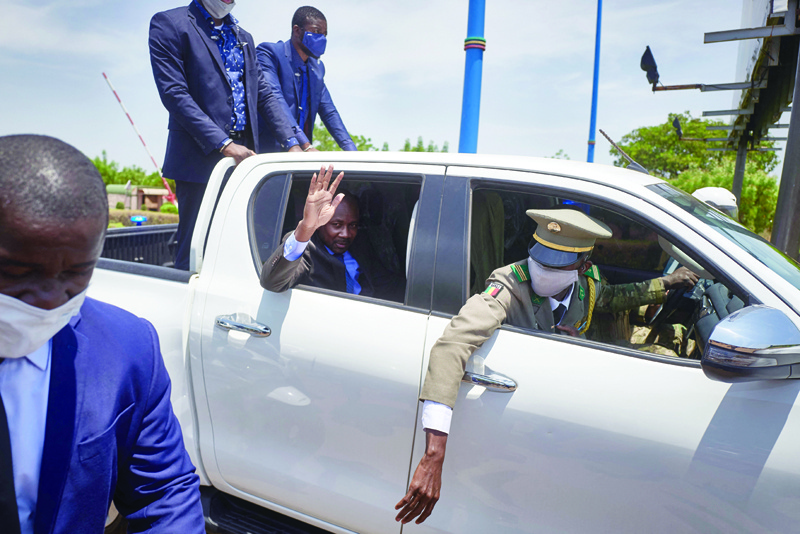 ACCRA: President of Mali's transitional government Colonel Assimi Goita waves from his vehicle as he returns from Accra where he met the ECOWAS (The Economic Community of West African States) representatives. - AFP
ACCRA: President of Mali's transitional government Colonel Assimi Goita waves from his vehicle as he returns from Accra where he met the ECOWAS (The Economic Community of West African States) representatives. - AFPBAMAKO: Malian strongman Colonel Assimi Goita met former Tuareg rebels on Wednesday, officials said, amid political uncertainty after the second coup in nine months in the fragile Sahel state. Goita last week deposed the leaders of a transitional government who were themselves installed after a coup in August which toppled Mali's elected president, Ibrahim Boubacar Keita.
The colonel had also led young army officers in ousting Keita, following mass protests over perceived corruption and his failure to quell a bloody jihadist insurgency. The political chaos has stoked fears about the future of a shaky 2015 peace accord, however, which some see as a key element in breaking Mali's cycle of violence. Mali was plunged into conflict in 2012 when local Tuareg separatists, supported by jihadists, revolted in the north of the country.
Islamist violence has since spread to central Mali and neighboring Burkina Faso and Niger. But in talks brokered in Algiers in 2015, several rebel groups, including ex-separatists, inked a peace deal with Mali's central government in a bid to stop the fighting. Implementing this deal is viewed by many as one of the few long-term solutions to the conflict, but it has never been fully implemented.
Goita met late Wednesday a delegation from the Coordination of Azawad Movements (CMA), according to a aide of the colonel's and officials from the group. The CMA is a mostly ethnic Tuareg alliance that rose up against the central government in 2012 but signed the 2015 accord. "The CMA was reassured about its concerns and reiterated its availability to support the transition," an official from the group said after the meeting. Opposition figure Choguel Maiga, who is tipped to become prime minister but is known for his opposition to the 2015 peace accord, was also present.
An aide to Goita, who also declined to be named, said that "peace, security and reconciliation" were discussed at the meeting. Meanwhile, the African Union announced it was suspending Mali with immediate effect and threatened the impoverished country with sanctions, after a second military coup in nine months. The putsch has sparked deep concerns over stability in the volatile Sahel region and warnings of economic penalties from across the international community.
The AU "decides... to immediately suspend the Republic of Mali from participation in all activities of the African Union, its organs and institutions, until normal constitutional order has been restored in the country", the body's Peace and Security Council said in a statement late Tuesday. The move follows a similar suspension on Sunday from the Economic Community of West African States (ECOWAS).
In its statement, the AU called for the military to "urgently and unconditionally return to the barracks, and to refrain from further interference in the political processes in Mali". It warned that if the military did not hand back power to civilian transitional leaders, "the Council will not hesitate to impose targeted sanctions and other punitive measures". Condemning the coup "in the strongest terms possible", it added it was "deeply concerned about the evolving situation in Mali and its negative impact on the gains made thus far in the transition process in the country". -AFP









